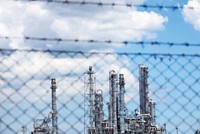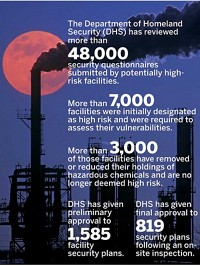Advertisement
Grab your lab coat. Let's get started
Welcome!
Welcome!
Create an account below to get 6 C&EN articles per month, receive newsletters and more - all free.
It seems this is your first time logging in online. Please enter the following information to continue.
As an ACS member you automatically get access to this site. All we need is few more details to create your reading experience.
Not you? Sign in with a different account.
Not you? Sign in with a different account.
ERROR 1
ERROR 1
ERROR 2
ERROR 2
ERROR 2
ERROR 2
ERROR 2
Password and Confirm password must match.
If you have an ACS member number, please enter it here so we can link this account to your membership. (optional)
ERROR 2
ACS values your privacy. By submitting your information, you are gaining access to C&EN and subscribing to our weekly newsletter. We use the information you provide to make your reading experience better, and we will never sell your data to third party members.
Safety
Homeland Security: Chemical Plant Regulations are Still Up For Debate
by Glenn Hess
January 17, 2011
| A version of this story appeared in
Volume 89, Issue 3
The dramatic shift to the right in the House will be strikingly evident in the House Homeland Security Committee, where conservative Rep. Peter T. King (R-N.Y.) replaces liberal Rep. Bennie G. Thompson (D-Miss.) as chairman.
COVER STORY
- - Congressional Outlook For 2011
- - Energy & Environment: Controlling CO2 Emissions Remains A Divisive Issue
- - Homeland Security: Chemical Plant Regulations are Still Up For Debate
- - Consumer Protection: Expect Action On Product, Drug Safety
- - Chemical Regulation: TSCA Reform Takes A Backseat
- - Patent Reform: Revived Subcommittee To Focus On Intellectual Property
- - Trade: Expect Early Approval Of South Korean Trade Deal
- - Rail Transportation: Update To Freight Rail Competition Policy Is In The Works
- - Science Policy: Oversight And Reauthorization Will Dominate Activity
King, who previously led the committee from 2005 to 2007, has indicated that he will push to give the Department of Homeland Security permanent authority for safeguarding U.S. chemical facilities against a terrorist attack, without significantly modifying the existing regulatory regime.
DHS currently regulates security at approximately 6,000 “high risk” chemical manufacturing plants and other industrial facilities throughout the nation under the Chemical Facility Anti-Terrorism Standards (CFATS), a temporary program begun in 2007.
King and other Republicans opposed a bill (H.R. 2868) introduced in the 111th Congress by Thompson and approved by the House in November 2009 that would have greatly expanded the scope of CFATS. In addition to giving DHS permanent authority to regulate security at chemical plants, H.R. 2868 would have granted the department new power to order the highest-risk facilities to adopt so-called inherently safer technology (IST), such as the use of less toxic chemicals or less hazardous processes, in order to reduce their attractiveness as potential terrorist targets.
That Democrat-sponsored bill failed to become law, though, when in July 2010 the Senate Homeland Security & Governmental Affairs Committee approved an alternative measure offered by Sen. Susan M. Collins (R-Maine) that would have extended the current CFATS program for three years, without the IST provision. Congress didn’t take final action on either proposal.
King’s policy positions on chemical plant security are largely mirrored by the chemical industry, which has been lobbying lawmakers to permanently authorize CFATS without making any major structural changes.
“We think the current program has worked very well,” says Calvin M. Dooley, president and chief executive officer of the American Chemistry Council, a trade group representing the nation’s largest chemical companies. The industry has worked closely with DHS and has invested more than $8 billion in security enhancements, according to Dooley. “We think CFATS is a very solid program that doesn’t need a lot of modification at this time,” he remarks.
Chemical makers will continue to adamantly oppose including an IST mandate in any CFATS authorization bill, Dooley notes. Decisions about how facilities manufacture their products and which chemicals are used “should be relegated primarily to the private sector,” he says.
In late 2006, Congress gave DHS limited authority and a three-year deadline to create and put in place a federal antiterrorism security program for high-risk chemical facilities. Lawmakers have thus far been unable to agree on how to structure the program for the long term and have kept it alive through a series of short-term extensions.
It’s unclear, though, how much of a priority a permanent authorization of CFATS will be for the new Congress.
In a statement issued shortly after the midterm elections, King said that under his leadership, the committee would initially focus on higher profile issues, such as “al-Qaeda’s tactic of recruiting and radicalizing individuals residing in America,” and draw attention to what he calls “homegrown terrorism.” He also wants to consolidate the dozens of congressional committees and subcommittees that currently oversee DHS’s operations.
“It’s doubtful that CFATS will be something we see in the first two months; perhaps by late spring or early summer we may see legislation,” says William E. Allmond IV, vice president of government relations at the Society of Chemical Manufacturers & Affiliates, a trade group.
It’s very likely that the 112th Congress will ultimately pass a bill that keeps the current CFATS program largely intact and up and running for at least a few more years, according to Allmond. “And I would not expect any legislation passing in the next two years to include an IST mandate,” he adds.





Join the conversation
Contact the reporter
Submit a Letter to the Editor for publication
Engage with us on Twitter